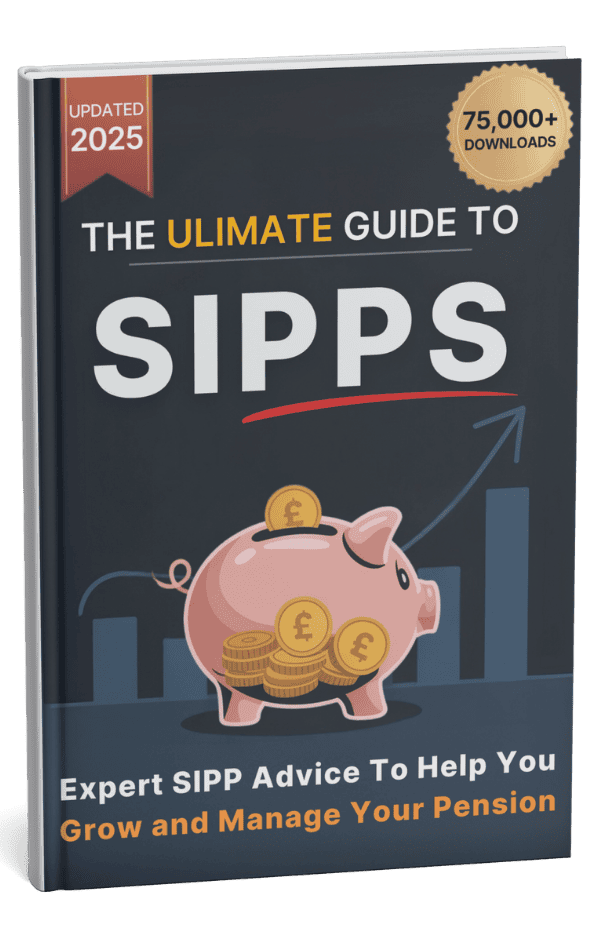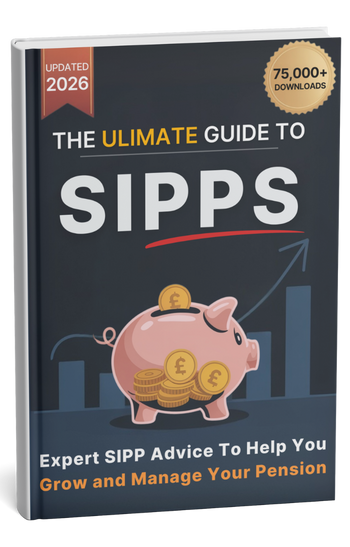
What Are the Benefits of a Hybrid SIPP?
See How Much Your Future Pension Income Could Be In Just 60 Seconds — No Fees, No Obligation.
How Much Could You Unlock?
Why Homeowners Trust Us
Try Our Free Pension Calculator
Quick, Safe Estimate

No Commitments
Key Takeaways
- Hybrid SIPPs blend traditional and flexible features, letting investors manage some investments while professionals handle others; unfortunately, this carries risks like higher fees from professional management and potential market losses.
- Setting up involves choosing a provider, opening an account, and selecting a combination of self-managed and professionally managed investments.
- Combining equity release with a hybrid SIPP could increase retirement funds but requires careful consideration of tax and benefit impacts.
The Hybrid SIPP is the middle ground between your typical personal pension and a self-invested personal pension.
It’s scary to think that one in five Britons over 35 and one in six over 55 don’t have any form of pension savings,1 so something like a Hybrid SIPP could be an option to look at.
In This Article, You Will Discover:
Navigating the world of pensions can be daunting, but that's why EveryInvestor is here.
As an authoritative source of financial information, we’ll guide you through the ins and outs of a Hybrid SIPP.
What Is a Hybrid SIPP and How Does It Work in the UK?
A Hybrid Self-Invested Personal Pension (SIPP) is a unique blend of traditional SIPP and Small Self-Administered Scheme (SSAS) available in the UK.

It harnesses the flexibility of a SIPP and the company-centric benefits of a SSAS, providing pension savers with a broader range of investment choices, including commercial properties and facilitating loans to sponsoring employers.
This form of SIPP allows members to control their investment strategy while providing added benefits to their business.
It offers greater control over tax planning, with tax-free growth on investments and the ability for the pension fund to borrow money.
It's an excellent solution for business owners and directors who want to fully utilise their pensions for both personal and business benefits.
Benefits of a Hybrid SIPP
A Hybrid SIPP combines the stability of a traditional pension with the flexibility of self-invested options. It’s designed for people who want part of their pension managed securely, while retaining control over where some of their money is invested.
Key benefits include:
- Balanced approach: Part of your pension is held in insured funds that aim for steady, low-risk growth.
- Flexibility: The self-invested portion lets you choose from a wide range of investments—such as shares, funds, or property.
- Diversification: Mixing managed and self-chosen investments helps spread risk across different asset types.
- Control and involvement: You can take a more active role in your pension while keeping part of it professionally managed.
- Potential for higher returns: By selecting your own investments, you could outperform standard pension funds—though this depends on market performance and your choices.
Risks of a Hybrid SIPP
While hybrid SIPPs can offer the best of both worlds, they still carry some risks. The value of your investments can fall as well as rise, and not all funds perform as expected.
Main risks to consider:
- Market volatility: The self-invested portion is exposed to market ups and downs.
- Investment choices: Poor decisions or lack of diversification can lead to losses.
- Fees and charges: Management and adviser fees can reduce your returns over time.
- Complexity: Balancing both managed and self-directed elements requires time and understanding.
- No guaranteed outcome: Even with insured funds, overall pension growth is not guaranteed.
How Does a Hybrid SIPP Differ from Other Types of SIPP?
A Hybrid SIPP differs from other types of SIPPs primarily in terms of investment options, flexibility, and costs.

Let’s take a closer look:
- Full SIPP - offers the widest range of investment options, including direct property purchases and unquoted shares, but with higher charges. In contrast, a Hybrid SIPP limits the scope for other investments but often reduces the charges.
- Low-cost SIPP - provides access to a range of funds at a lower cost. A hybrid SIPP may not be as cheap as a low-cost SIPP, but it offers a blend of insured and self-invested options, creating a balance between cost, security, and flexibility.
- Platform SIPP - typically offers a wide range of investment options but does not support more exotic investments like direct property or unquoted shares. While a Hybrid SIPP also offers diverse investment options, it mandates investment in the provider's insured funds.
- Robo SIPP - uses algorithms to manage investments based on your risk profile and goals, offering little to no human intervention. A Hybrid SIPP, on the other hand, allows for more control over investments, with the ability to manually manage the self-invested portion of the pension.
Would a Hybrid SIPP Be Suitable for Me?
If you are looking for a blend of security and control over your pension investments, this type of pension may be a good choice.
It's best suited to those who are comfortable with some level of investment risk, but also appreciate the stability offered by insured pension funds.
How to Set Up a Hybrid SIPP
Setting up a Hybrid SIPP usually involves contacting a pension provider, completing an application, and deciding on the split between insured funds and self-invested assets.
Seeking professional financial advice is always a good idea when making investment decisions.
Choosing the Right Hybrid SIPP
The right pension for you depends on your risk tolerance, investment knowledge, and retirement goals.
Consider factors such as the provider's reputation, the range of investments offered, fees, and the level of customer service.
Which Providers Offer Hybrid SIPPs?
These SIPPs are more often offered by insurance companies than traditional SIPP providers.
Research thoroughly and compare offerings before choosing a provider.
What Are the Alternatives to a Hybrid SIPP?
Alternatives to such pensions include other types of SIPPs, stakeholder pensions, and personal pensions.
Each has its advantages and disadvantages, depending on your circumstances and retirement goals.
Common Questions
A traditional SIPP allows full self-investment of the pension pot, whereas a Hybrid SIPP requires a portion to be held in insured pension funds, limiting the extent of self investment.
Yes, the main limitation is that a portion of your pension must be held in insured funds, which restricts the amount available for self investment.
Yes, it’s typically possible to transfer an existing pension into a Hybrid SIPP, but it’s important to seek professional advice first, as there may be charges or penalties.
You have control over the self-invested portion of your pension, but not over the insured funds.
This offers a balance of control and security.
The tax implications of these pensions are like all private pensions where contributions can be made tax-free up to your annual allowance.2
Your investment growth is tax-free,3 as is a 25% lump sum upon retirement.4
A Hybrid SIPP, or Self-Invested Personal Pension, is a combination of a traditional pension and a personal investment account. It allows pensioners to have more control over their investments by offering a wider range of investment options, such as stocks, bonds, and commercial property.
With a Hybrid SIPP, individuals can choose how their pension funds are invested and potentially benefit from higher returns.
A Hybrid SIPP works by transferring funds from a traditional pension into a self-invested account. Pensioners can then choose from a variety of investments based on their risk tolerance and financial goals.
The flexibility of a Hybrid SIPP allows individuals to actively manage their pension investments, making adjustments as needed. However, it’s important to consider the potential risks involved and seek professional advice before making any investment decisions.
A Hybrid SIPP can benefit a pensioner in several ways.
Firstly, it provides greater control and flexibility over investment choices, allowing pensioners to potentially achieve higher returns. Secondly, it offers the opportunity to diversify investments beyond traditional pension options, reducing reliance on a single investment.
Additionally, a Hybrid SIPP allows individuals to pass on any remaining funds to their beneficiaries upon death, providing a potential inheritance.
However, it’s crucial for pensioners to carefully consider their investment strategy, seek professional advice, and monitor their investments regularly to ensure they align with their financial goals and risk tolerance.
While a Hybrid SIPP offers potential benefits, there are also risks to consider. One risk is the volatility of investment markets, which can impact the value of pension funds.
Additionally, there may be a lack of guaranteed income, as returns depend on the performance of the chosen investments. Pensioners should also be aware of potential fees and charges associated with a Hybrid SIPP.
It’s important to understand these risks and ensure they align with individual circumstances and goals before proceeding with a Hybrid SIPP. Seeking professional advice can help mitigate some of these risks and navigate the complexities of investment decisions.
Investing in a Hybrid SIPP in the UK involves several steps. Firstly, individuals should research and choose a reputable provider that offers Hybrid SIPP options. It’s important to compare fees, investment options, and customer reviews. Once a provider is selected, the next step is to open a Hybrid SIPP account.
This typically involves completing an application form and providing necessary identification documents. After the account is opened, individuals can transfer funds from their existing pension into the Hybrid SIPP account.
It’s important to carefully consider investment choices, seeking professional advice if needed, and regularly review and adjust investments to ensure they align with financial goals and risk tolerance.
In Conclusion
A Hybrid SIPP offers a unique pension solution that combines the security of insured pension funds with the flexibility of self-invested assets.
This middle-ground approach presents an intriguing proposition for those willing to balance potential high returns with a safety net of lower-risk insured funds.
Despite its inherent risks, this type of pension could be an excellent choice for those comfortable with a certain level of investment risk and desiring greater control over their retirement funds.
Like any pension plan, however, it’s critical to seek professional financial advice to fully understand and effectively navigate the tax implications and other complexities associated with a Hybrid SIPP.







 100% private. No pressure. Just friendly guidance.
100% private. No pressure. Just friendly guidance.

